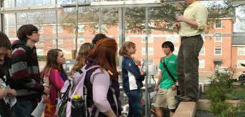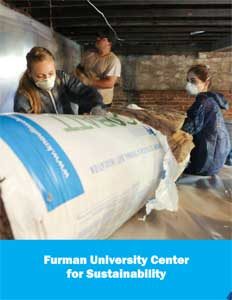Furman University Center for Sustainability
There is amazing progress being made
Business View Magazine profiles Furman University Office of Sustainability, campus-based office promoting sustainability initiatives and courses.
“You know, sustainability is this clunky, six-syllable word that people often question: ‘What do you really mean when you want sustainability?’ And there’s all kinds of jargon out there that can describe it.” These words were spoken, recently, by Dr. Angela Halfacre, Director of the David E. Shi Center for Sustainability, and Professor of Political Science and Sustainability Science at Furman University in Greenville, South Carolina. So, perhaps an exploration of the “jargon,” alluded to by Dr. Halfacre, is in order.
According to the U.S. Environmental Protection Agency (EPA): “Sustainability creates and maintains the conditions under which humans and nature can exist in productive harmony, that permit fulfilling the social, economic and other requirements of present and future generations.” Elsewhere, sustainability is explained as “the endurance of systems and processes. The organizing principle for sustainability is sustainable development, which includes the four interconnected domains: ecology, economics, politics, and culture.”
Halfacre, herself, contributes this elucidation: “I will say that the use of sustainability is encouraging our students, and ultimately our community, to take a long view and to understand the systems in which we all operate and to make them better, more efficient, and stronger.”
In addition to being one of the country’s most beautiful college campuses, and South Carolina’s oldest private institution of higher learning, having been founded in 1826, according to Halfacre, “Furman has one of the longest histories with sustainability of any college campus in the country. Our efforts can be dated back at least a quarter century with a whole host of individuals on our campus, faculty, as well as the administration, being very interested in identifying sustainability as a strategic goal. There was a real  strong push by faculty, as well as our president at the time, David Shi, to get more depth and breadth around the topics of sustainability, and especially in ways in which students could benefit from things that we tried here on campus or in the local community. A lot of those early efforts were organized around trying to ‘walk the talk’ here on campus.”
strong push by faculty, as well as our president at the time, David Shi, to get more depth and breadth around the topics of sustainability, and especially in ways in which students could benefit from things that we tried here on campus or in the local community. A lot of those early efforts were organized around trying to ‘walk the talk’ here on campus.”
In 2007, Furman became a charter signatory to the American College and University Presidents’ Climate Commitment (ACUPCC). The university’s Center for Sustainability was established in 2008. Soon after Halfacre arrived to take charge of the new program, she surveyed the entire campus – students, faculty, staff, and administrators – and discovered that people were most intrigued by the social aspects of sustainability. “Our students really want to give back to their community,” she explains. “They very much want to see a high quality of life across different and diverse populations and they really want to engage with helping to make a more sustainable society. A lot of our efforts have been to try and identify what the students’ interests were and help to support them to meet the goals that they have.”
So, over the past several years, Furman has worked to inculcate the school’s entire curriculum with more ways to study and apply sustainability than any other private liberal arts college in the country. Furman now offers 36 sustainability-focused courses and over 50 sustainability-related courses that span a variety of majors. “We have everything from a general education requirement around the connections between humans and the natural environment for all students to take,” says Halfacre. “We’ve worked, now, with a quarter of the faculty to help them to infuse sustainability topics into their existing courses. So, a course like American Government might now have a section on Sustainability as a Social Movement. A course in religion might have a topical area that’s covering the nature of sustainability as it relates to spirituality. Or a business course will have topics related to the triple bottom line, full-cost analysis, or other techniques about how businesses can better perform. We also have several interdisciplinary minors that are related to sustainability topics.” In addition, Furman offers the country’s only undergraduate degree in Sustainability Science. “It’s the fastest growing major that Furman’s ever had. Nearly 60 students have declared,” reports Halfacre.
The university also has a vibrant, paid student Fellowship program. Each summer, as many as 25 graduate students receive a stipend to focus on sustainability research and service on campus and in the community. Over the last eight years, 170 individuals have been Sustainability Fellows. Also, Furman’s Center for Corporate and Professional  Development offers a post-graduate diploma in corporate sustainability. So far, it has granted the diploma to over 100 individuals, representing approximately 75 different businesses and organizations throughout the Greenville region.
Development offers a post-graduate diploma in corporate sustainability. So far, it has granted the diploma to over 100 individuals, representing approximately 75 different businesses and organizations throughout the Greenville region.
Meanwhile, Furman’s 2700 undergraduate students have the option to engage in a wide variety of sustainability research and activities, including: working on the on-campus, organic-practice Furman farm; learning how to make sustainability assessments for corporations, colleges, and governments; making greenhouse gas inventories; learning how to collect data and do analyses; among many other topics. In the process, the students are gaining skill sets that are becoming more and more attractive to prospective employers.
“Every Fortune 500 company has sustainability in its strategic plan and/or they have a sustainability office, or director, or program,” says Halfacre. “This is not a fad. The opportunities out there have really expanded, substantially. And our students are not having a challenge either getting into graduate school or getting a job, in the sense that they have that leg up. They have the ability to be able to represent themselves well and open doors around sustainability topics. By giving them this toolkit, these experiences, these opportunities to learn about cutting edge work in the field and how to apply them pragmatically – it’s really a cascading series of benefits for these students as they go out into the workforce. We’re all about applied research; this is not ivory tower type work. This is work that is directly organized around trying to better corporations, or communities, or cities – the places where people live, work, and play.”
In furthering that objective, Furman students have reached out to the city of Greeneville to impart sustainability practices into the wider community. Over the last five years, its Community Conservation Corps has helped weatherize 70 low-income homes. Dan Weidenbenner, a 2011 Furman graduate, helped found Mill Village Farms, a local non-profit that trains at-risk youth in farming and entrepreneurship. And Greeneville has responded enthusiastically to the college’s outreach programs. According the Halfacre, the city has publicly said that it would like to be the “greenest Greenville in the country.” (There are 38 Greenvilles in the U.S.)
Halfacre says that over the next five years, she would like to gather more demonstrable evidence about the benefits of Furman’s sustainability programs. She would also like to concentrate on a training program for both faculty and students that would emphasize techniques that better measure environmental, social, and economic factors “in a more robust way.” In addition, the campus’ Sustainability Planning Council is charged with helping Furman meet the commitments of is 2009 Sustainability Plan. “Sustainable Furman” has eight primary goals and over 100 strategies. A key element of the plan is to make the campus carbon-neutral by 2026, the school’s 200th anniversary.
Like many of her colleagues at colleges and universities around the country, Halfacre sees her school as a microcosm of the larger society and a place where sustainability ideas, initiatives, and programs can be created and allowed to germinate: “Colleges and universities have a really unique and distinctive opportunity in that we can set an example and we can learn from our mistakes, so that others can benefit from our learning about those things. So by walking the talk, colleges and universities can provide the ideal living/learning laboratory.”
Today, sustainability is part of the fabric of life at Furman. And has Halfacre has noticed, “There is amazing progress being made.”
Check out this handpicked feature on Murfreesboro, Tennessee – Fast-growing and most livable.
AT A GLANCE
WHO: Furman University Office of Sustainability
WHAT: Campus-based office promoting sustainability initiatives and courses
WHERE: Furman University, Greenville, South Carolina
WEBSITE: www.furman.edu
PREFERRED VENDORS

Southeastern Paper Group – Southeastern is a leading distributor of disposables, packaging, janitorial/sanitation supplies and equipment with an emphasis on training and Green Smart solutions. The company has positioned itself as a single source supplier and consultant for virtually all business and government facilities in the following markets: Healthcare, Lodging and Hospitality, Packaging Systems, Building Service Contractors, Education, Food Service, Redistributors, and Supermarkets. www.sepapergroup.com



